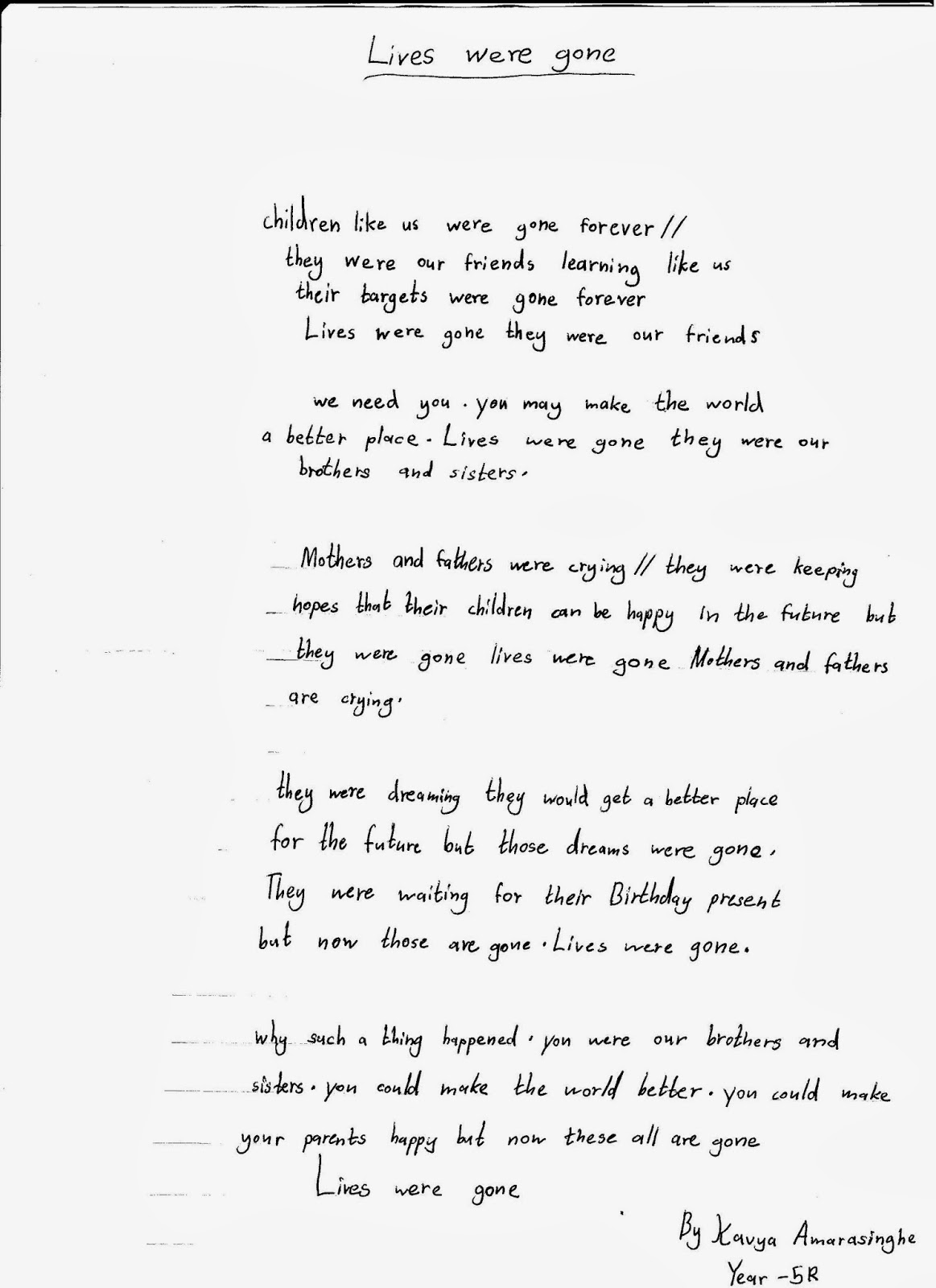Monday, 17 February 2014
Tuesday, 11 February 2014
Saturday, 8 February 2014
I am, because we
are
An anthropologist proposed a game to the kids in an
African tribe.
He put a basket
full of fruits near a tree and told the kids that whoever got there first
wins the sweet
fruits.
When he told them
to run, they all took each others hands and ran together,
then all sat
together enjoying their treats.
When he asked them, why they had run
like that as one could have had all the
fruits for himself,
they said:
''UBUNTU, how can
one of us be happy if all the other ones are sad?''
'UBUNTU' in the Xhosa culture means:
'UBUNTU' in the Xhosa culture means:
"I am, because
we are"
Thursday, 6 February 2014
A Vigil conducted to pay homage to the lost children in PSM
A vigil was conducted as a part of the Citizenship Studies programme at the key stage 2 assembly on Monday 3rd February 2014 to pay homage to the lost children in Pakistan school Muscat due to the tragic road accident which took place two weeks ago. Our students observed two minutes silence with a lit candles in their hands and also Kavya Amarasinghe in year 5R recited a poem written by her and a speech was given by Isra Gelani in yr. 5G.
Wednesday, 5 February 2014
The Missing Wand
Daffodils, Daffodils dainty and bright
Has my little wand come in your sight
It did come by us early today
But then we saw it wander that way
Dear cow, dear cow, have you seen my little wand
I woke up this morning to find it had gone
Yes, I saw a wand happy and sprightly
Make its way over the meadows so lightly
Where is my little wand?
I miss him so badly
I hear him finding me
screaming so loudly
Please come to me...
Please come to me...
I miss you so badly
Please come to me
By Sajini Fernando and Persis Benjamin
Year 8G
Sri Lankan School Muscat
Saturday, 1 February 2014
Mohan Das Karam Chand Gandhi, the father of nation popularly known as Mahatma Gandhi or Bapu was born on 2nd Oct. 1869.
His father Karam Chand Gandhi was the Diwan of Rajkot state. His mother Putlibai was “a religious and pious lady.
At the age of seven he went to school. He was an average student. He was always regular and punctual in his class.
At the age of thirteen he was married to Kasturba. After Matriculation and college studies he went to England to study law.
At the age of seven he went to school. He was an average student. He was always regular and punctual in his class.
At the age of thirteen he was married to Kasturba. After Matriculation and college studies he went to England to study law.
There he became barrister and returned home. He started his practice at Bombay and then he went to Rajkot, but he was not a successful lawyer.
In one case he had to go to South Africa. There he stayed for twenty one years. There he saw the pathetic condition of Indians.
In one case he had to go to South Africa. There he stayed for twenty one years. There he saw the pathetic condition of Indians.
He fought bravely against the White men’s injustice towards the Indians, who were called coolies. He started an Ashram there called Tolstoy Farm.
There he founded Natal Indian Congress. Due to his efforts Indian Relief Act was passed in 1914. This bettered the lot of Indians.
There he founded Natal Indian Congress. Due to his efforts Indian Relief Act was passed in 1914. This bettered the lot of Indians.
In 1915 he came back to India and joined Congress. He launched his Satyagrah Movement against the British. Under his leadership congress started non-violence and non-cooperation movement to oppose the unjust acts of British Government.
He led the historic Dandi March and broke the Salt Law. In 1942 he started “Quit India” movement and forced the British to leave India. At last due to his efforts India got independence in August 1947.
Frail in body and clad in a loin-cloth he had a magical influence upon others. He led a very simple life. He lived in Sewagram, a poor village. It was from there he led this country to freedom. He worked for the upliftment of Harijans.
Finally, when independence came, Gandhiji took a tour to Noakhali where Hindus and Muslims were fighting with each other.
He led the historic Dandi March and broke the Salt Law. In 1942 he started “Quit India” movement and forced the British to leave India. At last due to his efforts India got independence in August 1947.
Frail in body and clad in a loin-cloth he had a magical influence upon others. He led a very simple life. He lived in Sewagram, a poor village. It was from there he led this country to freedom. He worked for the upliftment of Harijans.
Finally, when independence came, Gandhiji took a tour to Noakhali where Hindus and Muslims were fighting with each other.
He observed fast to impress upon the people the need to live like brothers. But this man could not live with us for long.
On the evening of 30th January, 1948 Nathu Ram Godse fired three shots at him at Birla Bhawan while he was holding his prayer meeting as usual.
He was cremated on the banks of river Yamuna; Today his Samadhi at Rajghat has become a place of pilgrimage for people all over the world. Thus the true servant of humanity left his footprints on the sands of time.
He was cremated on the banks of river Yamuna; Today his Samadhi at Rajghat has become a place of pilgrimage for people all over the world. Thus the true servant of humanity left his footprints on the sands of time.
Subscribe to:
Posts (Atom)












